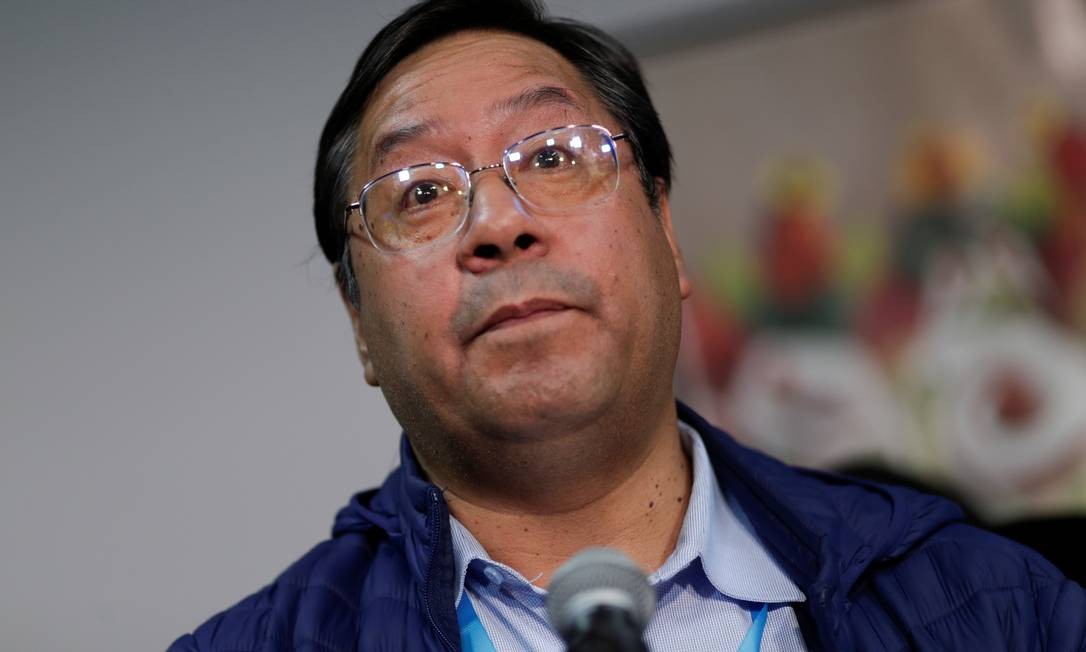RIO DE JANEIRO, BRAZIL – Economist Luis Arce, who surprised everyone by winning the Bolivian presidency in the first round on Sunday, benefited from the political capital built over decades by ex-president Evo Morales.
His unexpected victory in the first round, not anticipated by polls, paves the way for Morales’ return to Bolivia from his exile in Argentina and allows the MAS leader to reclaim his political position, 11 months after his resignation amidst social unrest.

“The MAS has broadly won the elections, including the Chamber of Senators and Deputies. Bolivia has Arce as president (…) Lucho (nickname of the MAS candidate) will be our president (…), he will return our country to the path of economic growth,” said the ex-president of Bolivia now exiled in Buenos Aires.
Arce won the elections as the standard-bearer of the Morales government’s economic bonanza (2006-2019), when he was Minister of Economy.
A 57-year-old economist, he studied at the state-run San Andres University in La Paz and earned a master’s degree at the University of Warwick in the UK.
He worked in the Central Bank for 18 years, where he held several positions, and was Minister of Economy and Finance for most of Morales’ presidential term, with an 18-month break. He has a more technocratic than political profile. He also taught and directed numerous courses at universities in Bolivia, the United States and other Latin American countries, including Harvard, Columbia and the University of Buenos Aires.
Under Morales, Bolivia raised its Gross Domestic Product (GDP) from US$9.5 billion per year to US$40.8 billion and reduced poverty from 60 to 37 percent, according to official data.
The prosperity enabled the payment of benefits to thousands of pregnant women, school children and the elderly, and millions of dollars in investments in attempts to industrialize lithium and natural gas. “We made appropriate decisions that led our country to lead several economic and social indicators in the region,” said Arce after being designated as the MAS presidential standard-bearer, an honor Morales had always had.
During his administration in charge of the Ministry of Economy, one of his most important -and controversial- measures was a succession of nationalizations, such as that of hydrocarbons. The new president of Bolivia maintained that this measure was one of the pillars of the country’s economic rebound.
Arce resigned from office in 2017 after being diagnosed with kidney cancer. After a long recovery in Brazil, he returned to Bolivia and reclaimed his position.
With strong criticisms of the Jeanine Áñez’s transitional government, he campaigned claiming that “the economy is not a game”, a way to leverage from his deep understanding of the Bolivian economy.
Father of three, Arce was born on September 28th, 1963 in La Paz to a middle class family. His parents were teachers.
His origin and upbringing are different from those of Morales, who was born into a family of modest peasants and llama herders, worked throughout his childhood, attended school only briefly, and has Aymara as his mother tongue. They are also different in terms of sports, as the ex-Minister likes basketball, while the ex-President loves soccer.
Although he always declared himself a left-wing politician, he was never considered an orthodox Marxist or a traditional communist militant.
First round victory
Last January, Arce was appointed by the MAS as its candidate for the presidency, a nomination that led to several divisions within the party, as the ex-Minister did not originate from the labor and peasant organizations. Nevertheless, Evo Morales stated that he was the right man to “safeguard the national economy”.
He always led the polls during the campaign. But there was uncertainty over the impact on the electorate of the challenges to Morales’ controversial victory in October 2019 in an election that was later overturned.
Allegations of fraud favoring the MAS leader’s reelection led to protests that prompted his resignation three weeks later. He went into exile in Mexico and then in Argentina, where he served as Arce’s virtual campaign manager.
The right-wing government and the remaining candidates aimed all their artillery at the MAS standard-bearer during the campaign. Furthermore, the Attorney General’s office, dependent on the government, accused him of “unjust enrichment” while he was a Minister, an allegation that Arce denied.
The right-wing candidate Luis Fernando Camacho claimed that “Luis Arce is not a candidate, he is a puppet of dictator Evo Morales.”
Ex-president Jorge Quiroga, a candidate but sidelined at the last minute, qualified him as a “money waster”, because of his millionaire spending on public works over 14 years.
Defeated candidate and former President Mesa assured voters that Arce and Morales’ economic achievements had not occurred “by their own merit,” but rather thanks to the high prices of raw materials “that no government has ever obtained” in Bolivia.
“The result was palaces, airplanes, luxuries, waste, corruption. The person to blame, obviously, was President Morales, but very particularly his Minister of Economy”, said Mesa.
Source: infobae

